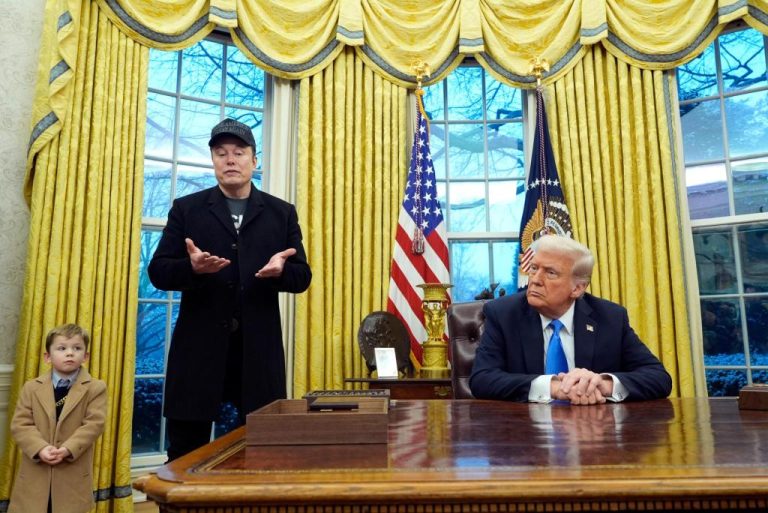

By AMANDA SEITZ, ANDREW DEMILLO and KEVIN FREKING, Associated Press
WASHINGTON (AP) — Republicans are weighing billions of dollars in cuts to Medicaid, threatening health care coverage for some of the 80 million U.S. adults and children enrolled in the safety net program.
Millions more Americans signed up for taxpayer-funded health care coverage like Medicaid and the Affordable Care Act’s marketplace during the Biden administration, a shift lauded by Democrats as a success.
But Republicans, who are looking to slash federal spending and offer lucrative tax cuts to corporations and wealthier Americans, now see a big target ripe for trimming. The $880 billion Medicaid program is financed mostly by federal taxpayers, who pick up as much as 80% of the tab in some states. And states, too, have said they’re having trouble financing years of growth and sicker patients who enrolled in Medicaid.
To whittle down the budget, the GOP-controlled Congress is eyeing work requirements for Medicaid. It’s also considering paying a shrunken, fixed rate to states. All told, over the next decade, Republican lawmakers could try to siphon billions of dollars from the nearly-free health care coverage offered to the poorest Americans.
Weeks before Congress began debating those changes, Republican governors in Arkansas, Ohio and South Dakota were making moves to implement Medicaid work rules of their own, likely to be approved by President Donald Trump’s administration.
And other cuts could be on the way. Already on Friday, the Republican administration announced it would shrink the Affordable Care Act’s navigator program annual budget by 90% to $10 million. Navigators are stationed throughout the country to help people enroll in ACA and Medicaid coverage and are credited with boosting the programs’ enrollment in recent years.
What Republicans are proposing
Speaker Mike Johnson of Louisiana has floated the idea of tying work to Medicaid.
“It’s common sense,” Johnson said. “Little things like that make a big difference not only in the budgeting process but in the morale of the people. You know, work is good for you. You find dignity in work.”
But about 92% of Medicaid enrollees are already working, attending school or caregiving, according to an analysis by KFF, a health policy research firm.
Republicans have suggested a work requirement similar to the conditions for the Supplemental Nutrition Assistance Program, commonly called food stamps. Those ages 16 to 59 must work or volunteer at least 80 hours a month if they are not in school, caring for a child under age 6, disabled, pregnant or homeless. On average, a SNAP enrollee’s monthly household income is $852, and the enrollee typically receives $239 in benefits.
During a GOP House retreat last month at Trump’s golf resort in Doral, Florida, Republicans said the requirement could motivate people to find employment — maybe even a job that comes with health insurance.
Rep. Darrell Issa, R-Calif., said the spending cuts should not be “on the back of the poor and needy” but instead target those who shouldn’t be getting the benefit.
“Why should somebody literally sit on the beach and surf, buy their sandwiches from the food truck with their food stamps and then pick up low-cost housing and so on, while writing a book,” Issa said, noting that he was describing a constituent from more than a decade ago.
Other cuts on the table include a proposal to change the federal government’s reimbursement to a per-person limit.
That would shift the costs to states, which might be forced to make tough choices about who or what they cover, said Joan Alker, executive director of the Georgetown Center for Children and Families.
“People still have health care needs even if you cut their coverage,” Alker said. “Their health care needs are not going to go away.”
Cuts to the program could also prompt upset, with just over half of U.S. adults saying the government spends “too little” on Medicaid. Only 15% say it’s spending “too much,” according to a January Associated Press-NORC Center for Public Affairs Research poll.
Some states are already making moves
President Joe Biden’s administration largely blocked states from enacting work rules of their own and required 10 states to remove the requirement for Medicaid coverage.
With Trump now back in charge, some Republican-led states are pressing ahead of Congress to add work rules again. Governors in Arkansas, Iowa and Ohio have announced they’d pursue approval from the federal Centers for Medicare and Medicaid Services to introduce work requirements again. And last fall, South Dakota voters signed off on a plan to add a work rule.
When Arkansas enacted a work requirement during the Trump years, about 18,000 people lost coverage. The rule was later blocked by a federal judge and Biden’s Democratic administration.
Some people lost coverage because they had trouble accessing the state’s website to log their hours or had other procedural problems, said Trevor Hawkins, an attorney with Legal Aid of Arkansas. The organization sued on behalf of Medicaid beneficiaries who were dropped from coverage.
“These hoops, these things are very consequential,” Hawkins said “There were a lot of people having hard times.”
In Georgia, 47-year-old Paul Mikell is all too familiar with those hoops.
He’s enrolled in Georgia’s Pathways to Coverage plan, which offers Medicaid for a slice of impoverished people who make just too much to qualify for traditional Medicaid. Georgia, which has not expanded Medicaid like most other states, requires that people work, volunteer or go to school for 80 hours a month in exchange for accessing the expanded health coverage.
Mikell makes 15-mile (24-kilometer) monthly drives to a government office where he reports his work hours. Sometimes, he said, when he goes online to check whether his hours were logged, they’re not there.
He likened navigating the online system to a battle — one fought on a computer at the library or borrowed from a friend.
In Idaho, where lawmakers are considering a state work rule and a three-year limit for Medicaid benefits, family physician Peter Crane estimates about two-thirds of his patients are enrolled in the program.
Many work on farms, on ranches or in the local phosphate mines. Before the state expanded Medicaid to cover those with incomes of up to 138% of the poverty level, many of his uninsured patients avoided the doctor entirely. One ignored abdominal pain for months, to the point of needing hospitalization for a severe gallbladder infection, he said.
“They’re not outliers,” Crane said of those enrolled in Medicaid during a state hearing last week. “They’re hardworking citizens of our state who are employed and running small businesses.”
Democrats are warning of the side effects for health care facilities, including rural hospitals and nursing homes. Hospitals have benefited from increased enrollment in health insurance programs such as Medicaid because it guarantees payment for a patient’s treatment.
“Hospitals will close, including in rural America and urban America and the heartland of America,” House Democratic leader Hakeem Jeffries of New York warned during a recent speech on the House floor. “Nursing homes will be shut down, and everyday Americans, children, seniors, those who are suffering with disabilities, will be hurt.”
DeMillo reported from Little Rock, Arkansas. Associated Press polling editor Amelia Thomson-DeVeaux in Washington and writers Charlotte Kramon in Atlanta; Rebecca Boone in Boise, Idaho; and Jack Dura in Bismarck, North Dakota, contributed.
Originally Published:






